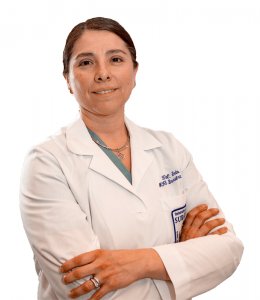SUNY Upstate doctor discusses quality of life of patients after bariatric surgery, and how surgery helps with other conditions such as diabetes and sleep apnea
By Chris Motola

Q: You have a lot of experience doing bariatric surgery and now serve as chief of bariatric surgery at Upstate University Hospital. What made you want to practice in Central New York?
A: The opportunity to work in academic environment and advancing my career in minimally invasive bariatric surgery as well.
Q: Bariatric surgery has been around for a while at this point. What have we learned about its long-term efficacy and risks?
A: There’s no question that it’s the most efficient in terms of helping patients the most with long-term weight loss and maintaining their weight. With non-surgical weight loss, the rates are still very low in terms of efficacy and keeping that weight off.
Q: What surprised me in talking to physicians about bariatric surgery is that the effect isn’t mechanical, but there’s a big hormonal effect as well.
A: Correct. We call our surgeries “bariatric and metabolic surgeries” because it’s not just about the weight loss but the changes we provoke in the gastrointestinal hormones of the patients and the way they interact with the brain. Those changes are favorable for the resolution of medical problems as well as weight loss.
Q: What is the quality of life like for patients after the surgery? You hear a lot rumors about only being able to eat a spoonful at a time.
A: In terms of evidence we have, the quality of life is very high for those patients. They are able to have less disease, less morbidity and many of their medical problems disappear when they lose weight. We give them the possibility of having a better life. We coach patients through the process. We have a comprehensive practice with nutrition services. We try to help them understand that lifestyle changes are important for their long-term success.
Q: Aside from obesity, what other conditions are helped by the surgery?
A: In terms of the patient population we treat, patients often come with other medical conditions associated with obesity like diabetes, high blood pressure, sleep apnea, sometimes acid reflux disease, as well as joint pain. So those are the most common. If you see the evidence we have of the effect obesity has in every single system and organ in the body, it’s a broad spectrum. Bariatric surgery can improve most of that.
Q: When you say obesity has an effect on every system and organ, can you give me some examples outside of the ones we more directly associate with obesity like diabetes.
A: [Obesity] increases the chances of developing cancer. Longevity decreases when you have obesity as well. We’re able to reverse that.
Q: How long is the recovery time?
A: We try to get patients up and running close to their normal lives almost as soon as they wake up from anesthesia, but we do want them to take some time off from work. We want them to adjust to the new way of eating with portion sizes. And, of course, they’re going to lose weight very quickly. So we recommend they take time off, not because of complications, but because we want them to be successful during this period. We’ve found that patients who aren’t given some time to adapt tend to struggle a bit more.
Q: I understand you were the only woman in your program back home. What was that like?
A: When I was training in Argentina, I was the only lady in a group of 20 guys. I think I was the second woman in five years in that program at the time. When I came to the U.S. it was a little different. But things have changed dramatically back home since then. It makes me feel old.
Q: Did you feel like a pioneer at the time? Or did you just not really think about it?
A: I didn’t. For me, I was a doing what I wanted to do. I still have a great relationship with some of my partners from that time.
Q: America has a reputation for having a particularly bad obesity problem. Is it a major issue in Argentina?
A: If you see the numbers, America has a little higher prevalence of obesity, but unfortunately it’s a global issue. The increase all over the world is alarming. It’s really more of a pandemic than a local epidemic.
Q: Since we can’t blame it, at least not entirely, on culture, what do we think is behind the obesity pandemic?
A: It’s multifactorial. If you see the most current information from the Obesity Medical Association, there are many reasons why we’re becoming obese. It’s not only about the fat deposit, it’s how it affects organs. It’s about how fat tissue produces hormones. It’s more than one thing. It can sometimes be genetically related. It’s not just about how much you eat and how much you don’t exercise. It can be chronic and relapsing. Even with bariatric surgery, if we don’t maintain lifestyle changes, it can come back.
Q: Other than diet and exercise, what are some of the issues at play?
A: The first approach for any patient with obesity, we have to try a plan of diet and exercise first. Patients, in terms of candidacy, are recommended to have tried several other approaches before trying surgery. Candidates also have to have a BMI of 35 and have associated medical conditions, or have a BMI of 40 without those conditions. We also have do to risk assessment to make sure they’re good candidates.
Lifelines
Name: Flavia C. Soto, M.D.
Position: Chief of bariatric surgery at Upstate University Hospital
Hometown: La Plata, Argentina
Education: Universidad Nacional de La Plata; post-doctoral fellowship at the Cleveland Clinic Florida; general surgery internship and residency at New York Medical College, St. Vincent’s Hospital, New York City
Affiliations: Upstate University Hospital
Membership: American Board of Bariatric Surgery; American Society of Metabolic and Bariatric Surgery; Fellow of the American College of Surgery
Family: Husband, two children (5 years old, and 7 months old)
Hobbies: Running, volleyball, cross-country skiing

